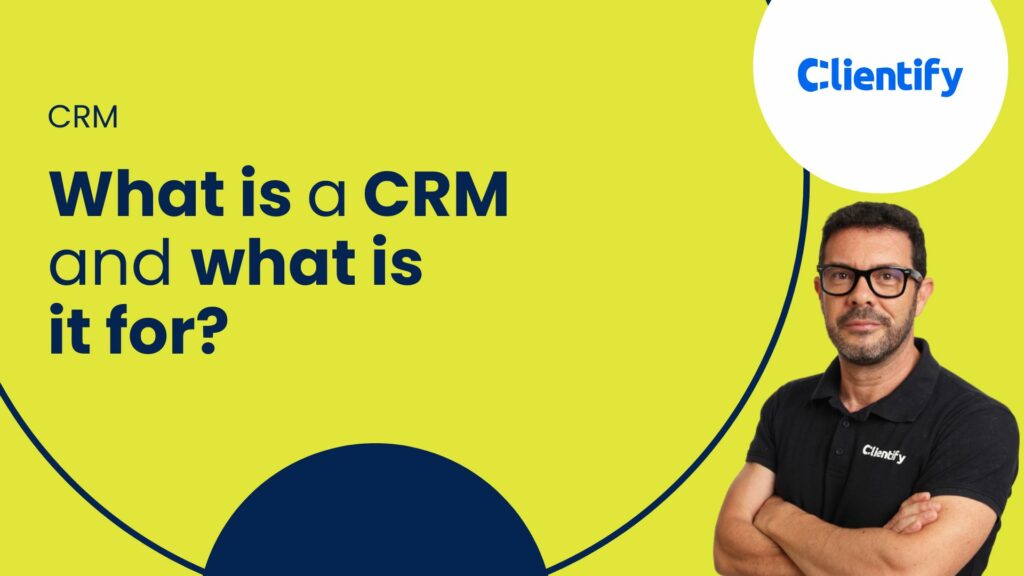Are you wondering what a CRM is and why everyone is talking about it? Here we explain it to you straightforwardly: a CRM (Customer Relationship Management) is a software that helps you to better manage your customers, centralizing all the information, automating tasks and improving the productivity of your team.
If you are interested in growing your business, selling more and building customer loyalty without losing your mind, you need one.
And in this post, you will discover how it can revolutionize your company from the inside.
Below, we explain in detail how a CRM works, what benefits it has, how to implement it correctly and what mistakes to avoid. It’s your complete guide to understanding and implementing a CRM like a pro.
- We clearly define what a CRM is and why it is important.
- We tell you what a CRM is for and how it improves your business results.
- You will discover the main features that make it a key ally for your business.
- You will learn about real examples of use in sectors such as ecommerce, marketing or health.
- We give you practical tips to implement and optimize your CRM from day one.
- In addition, we link you to useful resources for further learning.
Definition of CRM
A CRM (Customer Relationship Management) is a system that allows companies to efficiently manage their customer relationships. Sound technical? Actually, it is a practical and powerful solution for organizing data, automating processes and making decisions based on real information.
What exactly does a CRM do? It centralizes in a single platform all the information about your customers, contacts, sales and marketing actions.
This not only saves you time, but also allows you to have a clear view of each customer to offer them what they need at the right time.
In addition, a modern CRM goes far beyond customer tracking. It includes functionalities such as:
- Sales automation: you can learn more about this here.
- Customer segmentation: here is a complete guide on how to segment correctly.
- Key data collection: from interactions to buying habits. More info in this article on data collection.
In short, if you want to improve sales management, build customer loyalty and increase your efficiency, you need a CRM. And if it’s with a tool like Clientify, even better.
What are CRMs for?
A CRM serves, above all, so that you don’t miss opportunities. Thanks to it, you can manage your contacts, automate repetitive tasks and keep track of every interaction with your customers.
Ever heard of losing a sale because you didn’t follow up on time? With a CRM, that’s over.
In addition, CRMs help you to:
- Organize your customer database: Everything in one place, accessible and up-to-date.
- Personalize your communications: You’ll know exactly when to contact whom, and with what message.
- Automate marketing and sales processes: What used to take hours is now done with a couple of clicks.
- Make decisions based on real data: No guesswork, all with clear metrics and accurate reporting.
If you work in sales or marketing, a CRM will be your best ally to generate qualified leads (see this qualified leads guide) and automate your commercial strategy from A to Z.
In short, a CRM allows you to grow in an orderly and scalable way. And in our experience, it’s the difference between a business that reacts and one that leads.
And we see it every day because we help many companies become great businesses.
The importance of CRM in companies
If your company does not yet use a CRM, you are playing at a disadvantage. Because, let’s be clear: managing contacts with Excel is no longer enough.
The importance of CRM lies in the fact that it transforms the way a company understands, serves and retains its customers.
Why is it so important? On the one hand, it improves customer management, since all information is centralized, accessible and ready to use.
Do you want to know how many times a customer has bought from you, what products they are interested in or when was their last interaction? You have it all instantly. And on top of that, in several screens, alerts, activities…
On the other hand, CRM boosts sales because it allows automated follow-up of opportunities, management of personalized funnels and timely reaction with concrete actions.
In fact, many companies see a direct increase in conversion after implementing such a system.
If you want to take your sales strategy to the next level, don’t miss this content on sales process automation.
And yes, it also builds customer loyalty and retains customers. Because a company that knows its customers well and acts accordingly, generates trust. Think that from a CRM like Cientify you also communicate with contacts and customers by Email and WhatsApp mainly so you also know “how” they talk.
Are you lacking motivation? What a job you do 🙂 Here’s one more: a CRM reduces errors and improves your team’s productivity. So less repetitive tasks and more focus on what really matters: selling, serving and growing.
Essential components of a CRM
- Contact management: All your leads, customers and prospects organized and updated in real time.
- Interaction history: Emails, calls, meetings and notes… all recorded for effective follow-up.
- Automation: Workflows that trigger themselves. If you don’t know what they are, we explain it here: what are workflows.
- Reporting and analytics: Because you can’t improve what you don’t measure. CRMs show you where you are and what you need to optimize.
- Digital communications: From email marketing to WhatsApp Did you know that you can have a CRM connected to WhatsApp to respond faster and with AI?
CRM types and applications
Not all CRMs are the same. And not all companies have the same needs. That’s why it’s essential to understand the types of CRMs that exist and in which situations they are best applied. Here we explain it with clarity and examples, as always.
- Operational CRM: ideal for managing customer interactions. Automates sales, marketing and customer service. It is the most used by businesses seeking efficiency and growth through clear processes.
- Analytical CRM: here the focus is on data. If you want to analyze behaviors, detect patterns and predict trends, this is yours. Perfect for companies oriented to results and decisions based on KPIs.
- Collaborative CRM: designed to improve communication between teams (sales, marketing, support). Seamless information sharing between departments reduces errors and improves customer experience.
- Strategic CRM: focuses on the long term. It integrates all areas of the business to develop customer-centric strategies. It is ideal if you are looking to build deep and lasting relationships.
In our experience, many companies combine different types of functionality depending on their objectives. So before you decide, we recommend you review this guide to choosing the right CRM. Because, you know, it’s not just about having a CRM, it’s about having the right CRM for you.
Main functionalities of a CRM
A modern CRM is not just an address book on steroids. It is a powerful tool that brings together several key functions to automate, segment, analyze and act.
Let’s go through some of what we call “Functionalities” that make the difference between a basic CRM and one that really drives your business.
Contact and customer management
It all starts here. CRM allows you to easily store, organize and consult all the information about your contacts. You can see everything from their name and email to the interactions they’ve had with your brand. With this visibility, your team makes better decisions, acts faster and personalizes every message.
Automation of sales processes
Tired of doing repetitive tasks? A good CRM automates processes such as sending emails, assigning tasks or tracking opportunities. So you can focus on what’s important: selling.
Customer segmentation and business opportunities
With a CRM you create specific groups of contacts according to their interests, behaviors, funnel stages or any criteria you define.
This allows you to run personalized campaigns that convert more.
Reporting and data analysis
Data is worth gold if you know how to interpret it. CRM gives you real-time reports on sales, campaign performance, team productivity, among others.
This way you can adjust your strategy on the fly. And if you want to know how to measure customer experience, we recommend this article on how to measure customer satisfaction.
Integration with digital marketing tools
A powerful CRM does not work alone. Besides containing in itself, such as Clientify, email marketing tools, social networks, web forms and even WhatsApp Chatbots with AI you can connect them with other services through what we call Integrations.
If you are already working with a service or SaaS and you don’t want to do without it, you can connect it to Clientify.
And yes, you read that right. WhatsApp is serious, very serious. Here you can see how to take advantage of a CRM integrated with WhatsApp.
Benefits of using a CRM
The use of a CRM may seem at first like just another technical investment, but when you see how it transforms your company’s operations, you understand why it is a key ally in growth. Here are the most important benefits.
Optimization of marketing campaigns
With a CRM you can know which campaigns are working and which are not. You can also personalize your messages according to the type of customer, which translates into higher open rates, clicks and conversions. In other words: less effort, more results.
Improved customer service
Attention improves when you know your customer well. And a CRM with Ibox (or multichannel tray) allows you to do just that: respond quickly and with context.
You no longer need to ask “what was your name?” or “what product did you buy?”. Everything is there, ready to use. This advantage is noticeable, and very noticeable.
Coordination between sales and marketing teams
Your sales team doesn’t know what the marketing team is doing and vice versa? That generates chaos. A CRM unifies information and allows both to work in sync, aligning messages, times and objectives. Everyone wins, but above all, the customer.
Access to real-time information from anywhere
Are you out of the office? No problem. You can access your CRM from any device and check the status of a lead, schedule tasks or update a sale. The cloud has made working remotely easy, and CRM takes full advantage of it.
How to implement a CRM in your company
Deciding to use a CRM is just the first step. What is really important is to implement it well. Because a bad implementation can make the most powerful tool in the world useless.
At Clientify you have a CRM implementation and support service if you need it, although they have hundreds of resources if you want to go it alone.
However, read below to see some general aspects. Here we explain how to do it effectively, step by step.
Key Factors in Selecting the Right CRM Software
Before taking the plunge, you have to choose the right CRM. Not all of them are the same or serve the same purpose. You should consider ease of use, scalability, available integrations and technical support. If you don’t know where to start, this guide will help you choose the right CRM for your business.
Essential characteristics to consider
Your CRM should allow you to automate tasks, manage (marketing and communication) leads and access useful reports without complications. In addition, it is essential that it has functionalities that adapt to your business process and common channels such as WhatsApp, email and web.
CRM integration process
- Team training and adaptation to the system: without a committed team, there is no CRM that works. The key is to train them well and show them the benefits.
- CRM configuration and customization: adjust the fields, funnels and processes to the reality of your company. Don’t use the default without thinking about it.
- Impact measurement and continuous optimization: measure from day one. This way you will know if you are going in the right direction or if you need to adjust your strategy.
Pro tip: start with a small team, learn, adjust, and then expand the use of CRM to the rest of the company.
Best practices for the use of a CRM
Now that you know how to implement a CRM, you need to use it well. Here are the best practices to get the most out of your CRM from day one.
- Centralize all the information in the CRM: Don’t scatter data in spreadsheets or emails. Everything must be in one place.
- Update information in real time: A CRM with old data is useless. Make sure the whole team keeps it up to date.
- Automate repetitive processes: Create time-saving workflows. Here is a clear example of how workflows work.
- Segment your contacts to personalize messages: Not all customers are the same. Use segmentation to improve your results.
- Constantly follow up on your opportunities: Don’t let opportunities slip away due to lack of follow-up. A CRM alerts you when to act.
- Measure and analyze your KPIs: Reports will tell you what’s working and what’s not. So you can make smarter decisions.
- Integrate your digital channels: If you use WhatsApp, emails or forms, make sure you connect them to the CRM.
Pro tip: periodically review your configuration and flows. What works today may need to be adjusted tomorrow. And that, too, is managed from the CRM.
Challenges and considerations when using a CRM
A CRM can be a powerful tool, but like any technological solution, it also has its challenges. Anticipating them is key to take advantage of its full potential without frustration. Here is a quick list of the most common challenges and how to overcome them.
- Lack of team training: a CRM without users who master it is useless. Solution: train the team from the beginning.
- Resistance to change: some employees may reject the tool. Solution: show benefits and start with simple tasks.
- Inadequate configuration: if you don’t customize the system properly, it can become chaotic. Solution: configure based on your actual workflow.
- Excess information: if not segmented, unnecessary data accumulates. Solution: define clear criteria and use filters.
- Lack of follow-up and review: CRM is not static. Solution: review monthly and make adjustments.
Pro tip: more than implementing a CRM, it’s about building a work culture based on clear data and processes.
CRM and Artificial Intelligence
Artificial intelligence (AI) has revolutionized the world of software, and CRMs are no exception. Today, a good CRM not only organizes information, it also interprets and acts on it. How? Thanks to AI.
An AI-enabled CRM can:
- Predict sales opportunities: analyze historical data and behaviors to tell you which leads are most likely to convert.
- Automate intelligent responses: you can answer emails or WhatsApp messages according to the context, without human intervention.
- Automatically segment: group contacts by behavior, interactions or buying habits with predictive algorithms.
- Optimize workflows: suggests process improvements based on past performance.
And that’s just the beginning. AI allows your CRM to continuously learn and improve.
Therefore, integrating AI solutions is a safe investment for the future. If you already use WhatsApp in your business, you will be interested to know how a CRM with AI integrated with WhatsApp works.
Examples of CRM use in different sectors
A CRM is not just for large corporations or technology companies. Today, any business that has customers can (and should) use one.
In fact, at Clientify, we specialize in working with small and medium sized companies, SMEs.
From academies to clinics to travel agencies, CRMs can be adapted to all kinds of sectors. Here are a few examples that will surely make you feel identified… or at least make you smile.
Do it all with Clientify: engage, automate and close sales
Enter for free in the space where Clientify users share tips, help each other and learn how to sell more with AI.
Share your doubts and learn with others who are also growing their business.

Education and training
Imagine a language school with 200 students in 30 groups. How do you avoid mixing the “basic English” students with the “advanced French” students? Exactly: with a CRM.
These institutions use it to manage enrollment, send class reminders, segment students by level, and deliver personalized content. And if a student gets lost in the middle of the semester, the CRM tells you exactly when their last class was… and if they opened their last email. Sherlock “Jolmes” would be proud.
Industry and manufacturing
The glamour may be less here, but the CRM shines just the same.
Manufacturing companies use it to track order status, forecast inventories and coordinate with distributors.
In other words, so that “we promised delivery in 3 days… a month ago” is not repeated. Everything is recorded: who ordered, what they ordered, when they ordered it and at what stage of the process they are in.
E-commerce
If you have an ecommerce business, you know that chaos is real: abandoned carts, customers who ask the same question three times, promotions that don’t convert. This is where CRM comes in as a digital superhero.
It allows you to track behavior, launch campaigns based on purchase history and recover lost sales. And yes, you can know how many times that customer added the same product to the cart without buying it. Don’t worry, you’re not alone.
IT, telecommunications and software
In this industry, leads come pouring in, but not all of them are good. A CRM helps to classify opportunities, automate demonstrations and send personalized technical resources.
In addition, it allows the support team and the sales team to speak the same language, without the need for intermediaries or magic balls.
Marketing agencies
Agencies that manage a thousand campaigns a month: we understand you. A CRM allows you to assign tasks per client, schedule campaigns, automate emails and measure everything. It’s like having a planner with superpowers. The best part? You can see which campaigns are generating the most clicks without having to open ten tabs.
And no post-its stuck on the screen. Well, you can leave some if you feel like it.
Travel Agencies
These businesses manage destinations, hotels, flights, insurance… and expectations. A lot of expectations. A CRM helps to personalize offers according to the traveler’s profile, automate follow-ups and do post-trip follow-ups.
If your client received their Rome guide right after landing… that was the CRM. Or your God-level intuition… no, seriously, it was the CRM.
Health, beauty and wellness
In this sector, a CRM is the best ally to manage agendas, automate reminders and personalize recommendations.
If a clinic knows what treatment each patient received, when to come back and what product they liked best… it’s not magic. It’s well configured CRM. It also keeps you from recommending botox to the one who just went in for a facial. Small details, right?
Professional Services
Lawyers, consultants, architects… busy people. A CRM allows you to track projects, control deadlines, manage tasks and keep the client informed. The best thing is that you can have all the history of cases, meetings and files in one click. So you don’t have to rely on your memory, or that notebook full of notes in code that only you understand.
Finishing…
As you can see, a CRM is much more than a tool: it is a way to work better.
It allows you to get organized, save time, make better decisions and connect with your customers like never before. Whether you’re just starting out or you’ve been around for years, implementing a CRM that’s right for your business always adds up.
From sales automation to advanced segmentation to improved customer service, this tool gives you business superpowers.
And with solutions like Clientify, you have it all in one place, without the hassle.
Would you like to try it? For 14 days you can discover everything Clientify has prepared for you: funnels, automations, visual CRM, marketing, WhatsApp… all at no cost. Click, create your account and start enjoying smarter management. No risk. No commitment. Only results.
Activate your free 14-day trial here and see for yourself how it can help you sell more and better.
“The best tool is not the most expensive, but the one you actually use. And a well-used CRM can change everything.”




